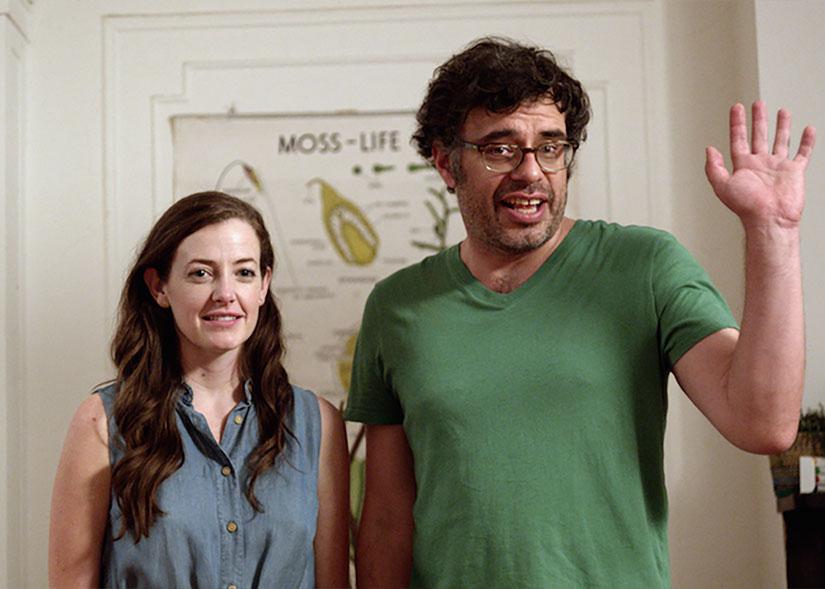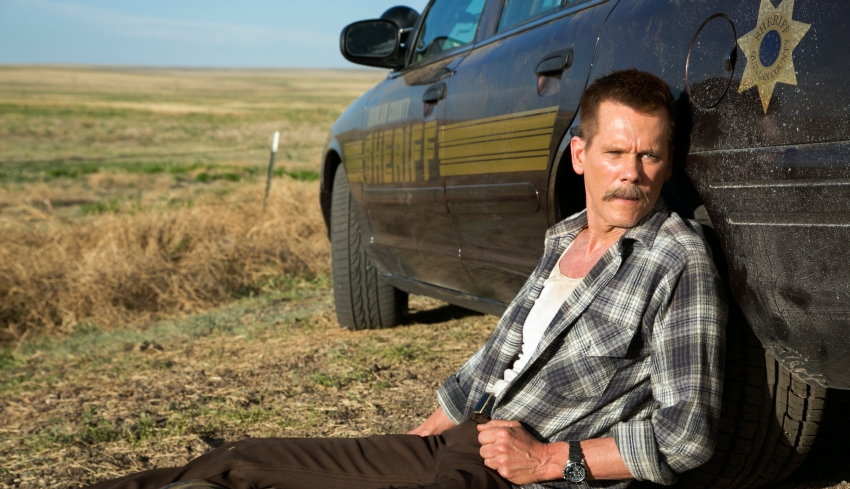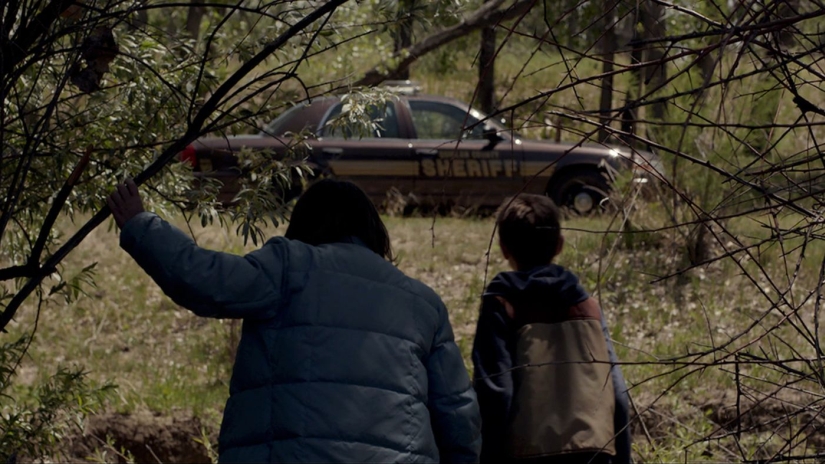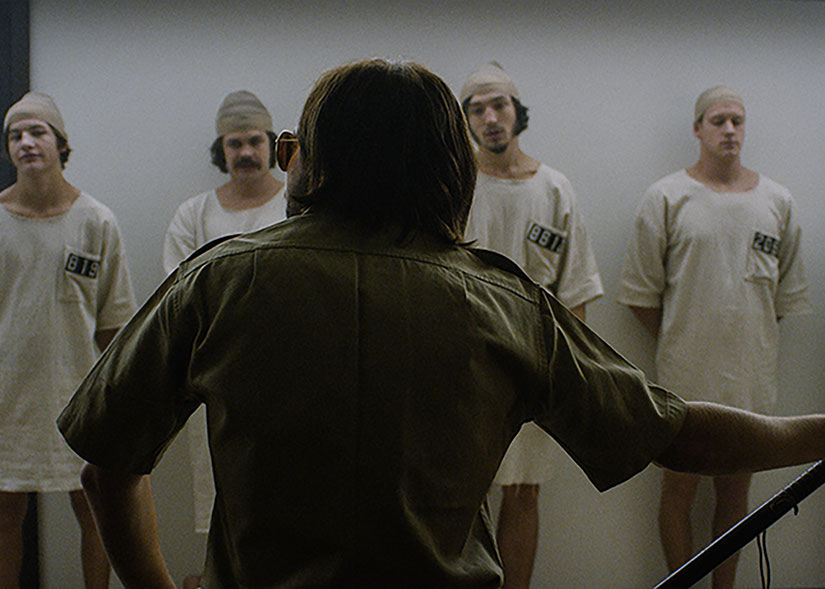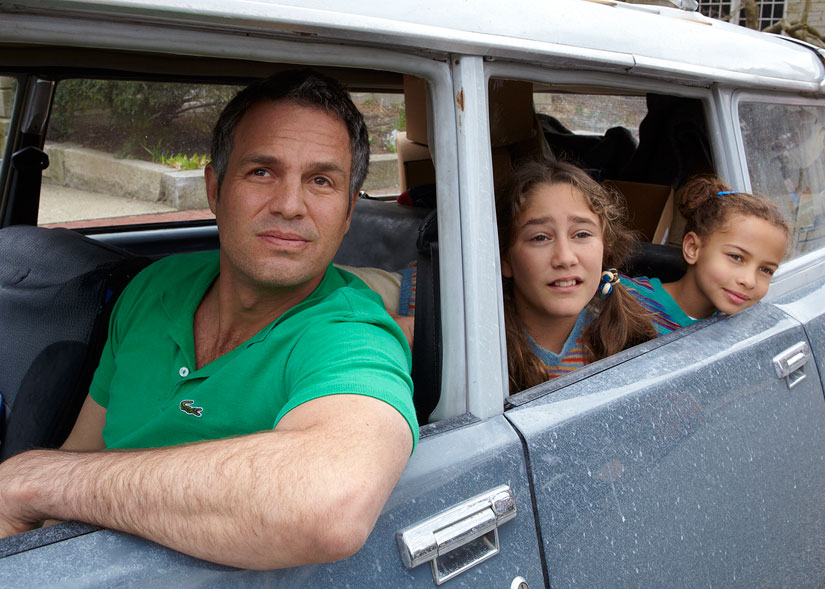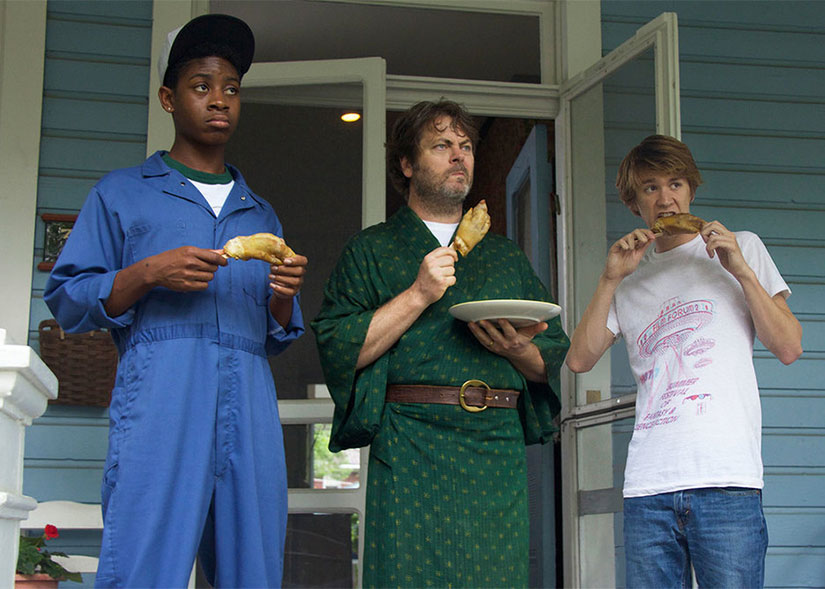[Review] 'Green Room' an unforgettable punk rock horror film
Independent director Jeremy Saulnier brings this twisted unforgettable tale of a momentous punk rock attitude crashing into the world of shock and uncertainty in Green Room.
Inspiring and struggling hardcore punk rock band members Pat (Anton Yelchin), Tiger (Callum Turner), Sam (Alia Shawkat), Reece (Joe Cole) are delusional punk rockers named the Ain’t Rights.
[youtube id="Q8XSARX3DQg"]
Low on funds with an itch to perform, the Ain’t Rights make their way to a back of the woods hardcore punk rock club. Unaware of its usual crowd the Ain’t Rights find themselves performing in front of REAL hardcore punk rockers who just so happen to be Nazi skinheads.
Leaving the show, Pat sees something he wasn’t supposed to see. Caught in the middle of a bad situation turned worse Pat and his band mates are thrown into a dark world of drugs and murder from the hands of the ruthless club owner and his no moral limit henchman.

Green Room
Director: Jeremy Saulnier
Rating: R
Release Date: April 22, 2016 (Chicago), April 29 nationwide
In Green Room we see these young inspiring punk rockers go through hell trying to make it out alive. This real human reaction leaves a unsatisfying feeling of unpleasantness because of the unfamiliar future of what may happen next.
This in your face cut throat style of story telling leaves urging questions of what’s going to happen next. Focusing and centering the green room located backstage of the bar they just performed in visual director Saulnier uses every inch to paint a haunting picture of no escape.
Amber (Imogen Poots) and Pat (Anton Yelchin) stood out as both unsuspecting untraditional figures. All the characters in the film go against what we’ve seen in past horror thrillers which also creates a surprising momentum of story telling.
Music fans will also enjoy this film for it’s taste and showcasing of music from artist like Corpus Rottus and Battletorn as well as original music from the films band the Ain’t Rights.
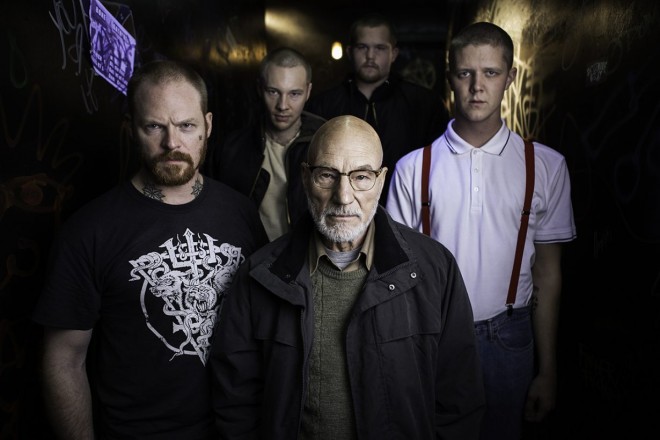
A huge standout moment of the film is how Patrick Stewart emerges as a complete terror and haunting villain with no human remorse. As the leader of white skinheads, Stewart’s soft spoken portrayal is truly menacing.
Stewart’s portrayal alone is reason enough is see this film but definitely not its only one. In Green Room we see a captivating story that leaves us wanting more every second. This thriller is one that many will talk about for years for it’s original take and its brilliant delivery.
Check out the interview with producer Jeremy Saulnier.
[Review] People, Places, Things
This review is being re-posted to coincide with the film's VOD and theatrical release.
In most comedies involving a break-up between parents, the plot tends to naturally vilify the parent opposite of the lead, portraying them as some type of evil entity whom the lead must conquer and triumph over to win. However, this isn't often the case in real life situations, and People, Places, Things does a great job of being an inherently funny film without having to trap its characters in outlandish situations to garner laughs from its audience. However, will that be enough to hold over those who have come to expect such cartoon-like comedies?
People, Places, Things
Director: Jim Strouse
Rating: N/A
Release Date: January 26, 2015 (Sundance), August 14, 2015 (VOD, theaters)
On his twin daughters' birthday, graphic novelist Will Henry (Jemaine Clement) walks in on his wife, Charlie (Stephanie Allynne), cheating on him with another man, Gary (Michael Chernus). A year later, Will is a divorcee living in a small studio apartment in Queens with weekend visitation rights. His depression, while never taking over or defining his character, begins to show through his art and teaching during his classes at the School of Visual Arts. After discovering Charlie is pregnant and intends to marry Gary, Will requests more time with the girls, and is shortly given such time when Charlie drops them off one night. Struggling to juggle his job and responsibilities with the girls, he requests help from his student, Cat (Jessica Williams) and her mother, Diane (Regina Hall). Before long, Cat and Will hit it off, but the allure of reuniting with Charlie and completing their old family dynamic threatens to derail anything new in Will's life.
Like I mentioned earlier, most comedies of this ilk like to pit ex-lovers against one another in some type of competition, but People, Places, Things doesn't go that route. In fact, despite a few disagreements, both Will and Charlie genuinely like each other. Rather than creating a conflict that's person vs. person, People, Places, Things falls more in line with person vs. self conflict, and it could be argued that the film is just as much a coming-of-age film as it is a dramedy. Writer/director Jim Strouse wrote the script with some of his personal anecdotes in mind, which help explain why the script feels so grounded in reality. Despite a solid script with well-crafted jokes, the film wouldn't have worked as well had Clement not been cast in the role of Will.
In a way, People, Places, Things is a bit of a vehicle for Clement as he's able to show off his quick-witted timing and his ability to balance that with drama. Fans of Flight of the Conchords will feel familiar with Clement's witticisms and side jokes, but can also appreciate Will's longing to be a good father.
People, Places, Things is a solid dramedy that serves as a highlight role for Clement. Anybody interested in a realistic comedy that doesn't create villainous caricatures of its characters will be drawn to the film, as well. However, audiences that have grown too familiar with Judd Apatow, Will Ferrell, or Paul Feig films may find People, Places, Things a bit too pedestrian for their tastes.
[Review] Cop Car
In the opening scene of Cop Car, writer/director Jon Watts establishes the two different worldviews that make his film a compelling thriller. There's the child world and the adult world. The child world is one of fantasy and games without consequences. Friends Travis (James Freedson-Jackson) and Harrison (Hays Wellford) have run away from home, and they think they can survive on their own with just a Slim Jim and their ability to curse without repercussions. The adult world, by contrast, is one of violence, manipulation, and murder. But Travis and Harrison don't know that yet. They will soon.
Cop Car's demarcation between the child world and adult world is so pronounced that it's almost like a fairy tale. Rather than crossing the village border for the dark woods, our nine-year-old runaways crawl past a barbed wire fence. Eventually they find an abandoned cop car and take it for a joy ride. Had Travis and Harrison not stumbled onto the cop car, they probably would have given up running away and been back with their respective parents by sundown. Instead, they wind up deep into the ugly adult world where it's unlikely that they'll make it through the night.
[youtube id="MBK_9GlVlc0"]
Cop Car
Director: Jon Watts
Rating: R
Release Date: August 7, 2015
Cop Car has a lot in common with Coen Brothers thrillers like Blood Simple and No Country for Old Men. There's also a strong vibe of Jeremy Saulnier's lo-fi 2014 revenge movie Blue Ruin. Regular people wind up way over their heads in an uncontrollable situation, and they're forced to deal with it to survive. There's this black comedy that comes from confrontations with one's own ineptitude (or inflated sense of ability) during life or death situations. With the two child leads, there's this childlike sense of "No way!" when they steal the cop car and drive off, a kind of young incredulity about the unchecked freedom of adulthood. They speed, they drive on the wrong side of the road, they play with guns, they think they're invincible.
Then in comes Kevin Bacon, who plays Sheriff Kretzer, the cop whose car was stolen. Kretzer's shady backstory gets revealed slowly but not fully as the film unfolds. Watts is smart not to provide all the details and instead just gives enough pieces for the audience to reconstruct his crimes. It makes the world of Cop Car feel more lived-in. Like the child runaway plot and fairy tales, we're familiar with this kind of dirty-cop story too.
The kids think they're in control but wind up losing it. Kretzer's got the opposite arc of control, and spends early parts of Cop Car helplessly trying to cover his own ass with the people at police dispatch. There's something comically Benny Hill-ish about him running panicked through a open field when he can't find the car; you can almost hear an internal monologue of "oh crap, oh crap, oh crap" with each stride. On top of that, something about the mustache and his posture makes Kretzer look like a side character from Super Troopers. Yet Krezter is a good improviser, and he knows how to use the system to his advantage.
Bacon imbues Kretzer with a wolf-like menace. His desperation makes him seem like some raging animal in a frenzy, but he becomes more refined as the situation becomes clearer and he sees an opportunity to re-take control. When he's finally able to talk to the boys over the police radio, there's this stern, authoritative quality to Bacon's voice that conveys a clenching fist and gnashed teeth and a loaded gun. The Krezter character and Bacon's performance are rooted in the black comedy of sudden ineptitude and black-hearted desperation.
In addition to the child world being subsumed by the adult world, there's also an interesting inversion of dominance going on between Travis and Harrison. Travis seems more like the leader of the two boys. The smaller of the two, he's recklessly brave, more vocal, willing to drop and f-bomb and play mischief maker during their dalliance with running away. Yet as the situation becomes more dangerous and the boys find themselves deep in danger, Travis' young bravery recedes and Harrison needs to find a way to assume the lead.
Watts proves a capable director of actors as well as action, controlling his shots and dialing back extraneous sounds to get the maximum dread and tension from a moment. I found it surprising that he was tapped to direct the Spider-Man reboot for Marvel Studios, though. Nothing about Cop Car screams, "This guy is a perfect fit for Spider-Man." (With great Cop Car moments comes great responsibility?)
It seems like part of a pattern of promising indie directors being handed the reins to major studio tentpoles. Think Marc Webb on The Amazing Spider-Man and its sequel, Colin Trevorrow doing Jurassic World, and Josh Trank on Fantastic Four. It's a bit of a surprising trend, one that gives fledgling directors big breaks but may also break their spirits given the creative compromises required to work on a major studio film. As noted in our Ant-Man review, the MCU films are producer/studio-driven rather than director-driven. The cynical part of me thinks that studios believe these indie directors will be more compliant, that they're starving for the breakout hit and will do whatever they're told. That's not always the case. Selma director Ava DuVernay was offered Marvel's Black Panther but passed due to creative differences.
The worst thing that could happen to Watts on Spider-Man is reducing him to a journeyman director, draining him of his talent simply to deliver a competent film on time. I want to go back to Watts' debut, a 2014 horror film called Clown, to see what else his abilities suggest he's capable of. Cop Car makes me want more original work in Watts' future. One hopes his big-studio adventure over the barbed wire fence goes well.
[Review] The Stanford Prison Experiment
This review was originally published as part of our Sundance Film Festival 2015 coverage. It is being re-posted to coincide with the film's limited theatrical release.
By now, most adults are familiar with the Stanford prison experiment. In 1971, a study was conducted to explore the psychological effects of prisoners and guards in a simulated prison. What resulted inevitably proved to be valuable information for psychology, but damaging to some of the participants. The Stanford Prison Experiment is a fictional take on the experiment that dramatizes the various conflicts that took place.
The Stanford Prison Experiment
Director: Kyle Patrick Alvarez
Rating: N/A
Release Date: January 26, 2015 (Sundance)
In 1971, Stanford Psychology professor Philip Zimbardo (Billy Crudup) compiles a group of volunteers to conduct his psychological study of the relationship between prisoners and guards. Left to police themselves, the guards quickly exploit their power and creating friction between the two factions. As the mistreatment continues, some of the prisoners, led by Prisoner 8612 (Ezra Miller), begin to revolt back against the guards, led by a "John Wayne-esque" guard (Michael Angarano). As the experiment devolves into a simulation and more of Zimbardo's colleagues leave the experiment, Zimbardo finds himself wholly captivated by the ensuing results. However, it isn't until Zimbardo's girlfriend (Olivia Thirlby) joins the experiment that he truly realizes his mistake and calls the proceedings off... but is it too late for some of the prisoners?
The Stanford Prison Experiment is rooted in its feelings of claustrophobia to characterize the discomfort the prisoners experience, whether they take place in the form of tight, close-up shots in both enclosed closets and open hallways. The suspense builds through the film as each prisoner slowly breaks from their psychological torture, yet The Stanford Prison Experiment never feels like there's anything truly at stake. The tension bubbles and boils, but it never really reaches the breaking point. Could this arguably have been a conscious decision to play with the film's theme of psychological torture? Perhaps, but I think that's giving the film too much credit.
Miller and Angarano shine as foils to one another, but considering the mostly anonymous nature of the experiment, no one really shines beyond the two. In fact, once Miller's character is released from the experiment, no one prisoner/actor steps up to fill the glaring hole in the film's conflict, allowing Angarano's antagonist to take over.
The Stanford Prison Experiment is a psychological suspense/thriller that ultimately doesn't pay off in the end. It doesn't help that the film is very slow moving and feels way too long. I can't express how great Miller and Angarano's performances are, but I'm not entirely sure plodding through the film is worth seeing them.
[Review] Infinitely Polar Bear
[This review was originally published during our Sundance 2014 coverage. It's being re-posted to coincide with the film's limited theatrical release.]
Infinitely Polar Bear
Director: Maya Forbes
Rating: N/A
Release Date: January 18, 2014 (Sundance), June 19, 2015 (limited)
Infinitely Polar Bear is based on writer/director Maya Forbes' childhood, so it's hard to say what I have to say about the film without an internal pang of guilt surrounded my honesty. To be critical of a film is hard when the film is a representation of a person's real life, and while I've been able to deal with the separation more often than not in the past, I find myself torn as I write this. Consider this paragraph my cold opening for a film that, despite its every attempt to warm my heart, left me feeling chilly.
Cam Stuart (Mark Ruffalo) is a manic depressive father of two who's estranged from his wife, Maggie (Zoe Saldana). After a severe breakdown hospitalizes Cam, Maggie and their daughters Amelia (Imogene Wolodarsky) and Faith (Ashley Aufderheide) are forced to move from their idyllic country home to the city due to Cam's bills. As his health gradually recovers, Maggie finds herself in a growing financial rut. Her best bet is to leave Boston to attain her Master's Degree in New York, entrusting the care of the girls to Cam. What transpires is a test of emotional and psychological strength as Cam and the girls attempt to build and maintain a healthy family dynamic.
Infinitely Polar Bear is a feel-good film, but is sometimes too much at times. Cam's manic depression is treated more as weird tics and character quirks than a real affliction. Is this due to artistic license? Perhaps this is how Forbes saw her own father? We all cope and deal with problems differently, and this could simply be a case of that, but the film downplays Cam's affliction as a cute eccentricity.
Despite that, Ruffalo's performance in Infinitely Polar Bear is probably my favorite of his in recent years. He plays Cam loose, and it fits into the context of the film. Other reviews I've seen elsewhere have characterized his Cam as a manic pixie guy (alluding to the "manic pixie girl" archetype that has arisen in films over the past decade), and I can't argue that. Again, it fits into the film well, but when the crux of the film involves this man's manic depression and how it affects the relationships he has with his family, you'd expect more depth and emotional toil than what's depicted.
[Review] The Overnight
[This review was originally published during our Sundance 2015 coverage. It’s being re-posted to coincide with the film’s limited theatrical release.]
The Overnight represented a change of pace for my Sundance 2015 coverage as the first comedy of the week amidst an onslaught of dramas. Featuring a stellar cast comprised of Taylor Schilling (Orange is the New Black), Jason Schwartzman (The Grand Budapest Hotel), Adam Scott (Parks and Recreation), and Judith Godreche (Stoker), The Overnight is a well-told comedy that utilizes a plot twist the likes of which M. Night Shyamalan could never accomplish.
The Overnight
Director: Patrick Brice
Rating: N/A
Release Date: January 23, 2015 (Sundance), June 19, 2015 (limited)
Making new friends as adults and parents can be difficult sometimes, especially when moving to a big city like Los Angeles, as Alex (Scott) and Emily (Schilling) discover. However, during a trip to the park, Alex’s son RJ (R.J. Hermes) befriends another boy, Max (Max Moritt), which leads to his father, Kurt (Jason Schwartzman), to introduce himself to the couple. After sensing something special within them, Kurt invites Alex and Emily over for dinner that night. As the night progresses and the liquor pours, Alex, Emily, Kurt, and Kurt’s wife Charlotte (Godreche) begin to form new bonds. However, things slowly begin taking a sinister turn as Alex and Emily soon realize Kurt and Charlotte might have ulterior motives for inviting them over.
The casting in The Overnight is spot-on with each actor fitting into their roles perfectly. Scott plays to type with the innocent, naïve Kurt, Schilling plays the strong, guarded Emily, Schwartzman plays the douchey but well-intentioned Kurt, and Godreche plays the sexy, sultry Charlotte. Each actor plays off each other well, especially when Scott and Schwartzman are given free reign to bounce off one another.
[youtube id="QoN2F22eUBA"]
The comedy in The Overnight is a bit raunchy, but not to Apatow levels. However, in saying that, expect some cod pieces and a plethora of pubic hair (too much, if you ask me). The visual gags are funny, sure, but as I mentioned earlier, the true humor is within the interaction between the cast. I’ve softened my stance in regards to Schwartzman over the past few years, and I think The Overnight helped me realize just how comfortable and proficient he is in playing wealthy, indulgent types while still being likable and relatable.
The Overnight is a different type of comedy that we see nowadays. It’s not too clever for its own good, nor does it rely on the raunchiness of its jokes. Rather, it combines the right amount of wit and perversion that anybody would enjoy.
[Review] Me and Earl and the Dying Girl
This review is being re-posted to coincide with Me and Earl and the Dying Girl's theatrical release.
Going into Me and Earl and the Dying Girl, I expected something akin to The Inevitable Defeat of Mister and Pete in the sense that it would be a grounded, coming-of-age film about friends trying their hardest to get through adversity. In a way, I was both completely off the mark and somewhat on the money, but in the best ways possible. Simply put, Me and Earl and the Dying Girl ultimately proved to be the breakout film of Sundance 2015.
Me and Earl and the Dying Girl
Director: Alfonso Gomez-Rejon
Rating: N/A
Release Date: January 25, 2014 (Sundance)
Greg (Thomas Mann) has made it to his Senior year without pledging allegiance to any one high school faction, yet has built up enough rapport with each to not also cause friction with them. Despite this, he has no friends, save for Earl (RJ Cyler), his partner-in-crime since they were little. Together, they spend their lunches with their history teacher (Jon Bernthal) and watch classic films, even going so far as to re-create them. Greg's status quo is thrown off when his mother forces him to hang out with Rachel (Olivia Cooke), a fellow Senior recently diagnosed with leukemia. As their friendship progresses, the two begin to grow closer as Rachel's illness unfortunately begins to progressively get worse.
Greg soon begins to break out of his shell and actually finds himself as a whole, individual being rather than a transparent everyman meant to appeal to everybody. He also begins to form actual friendships and relationships (throughout the film, he refers to Earl not as his friend, but as his "co-worker" for fear of attachment and loss). The chemistry between Mann and Cooke is front and center for this progression. Mann's been building his star since his role in Project X, and Me and Earl and the Dying Girl is the perfect type of film to show off his penchant for both comedy and drama. Cooke's take as a girl inevitably facing death but still trying to not have the disease define her is more layered than the typical "damsel in distress," but is sometimes relegated to a supporting character to Mann's spotlit performance. However, Mann's performance wouldn't be nearly as strong were it not for his interaction with Cooke.
[youtube id="eCGyXDU0HOM"]
Throughout the film, snippets of the sweded films Greg and Earl shot are shown, similar to Be Kind, Rewind, homaging such varied films as Apocalypse Now (A Box O' Lips, Wow), Breathless (Breathe Less), A Clockwork Orange (A Sockwork Orange), and more, which should make for a good special feature when the film's released on home media. Beyond the easter egg nature of the films, they prove to establish Greg and Earl's characters, and represent the biggest subplot of the film that culminates in Greg's final film dedicated to Rachel. In a way, the completion of that film completes Greg's year-long journey to becoming a tangible person with tangible attachments and feelings.
Me and Earl and the Dying Girl balances comedy and drama perfectly, with the high and low emotional hits coming at the proper moments. By the end of my screening, there was a hushed silence as everybody processed everything they saw, which ran counter to the beginning of the screening with everybody laughing loudly. It's hard to make comedies and make people laugh, and it's hard to make dramas and make people think - it's doubly as hard to accomplish both effectively within the same film, but Me and Earl and the Dying Girl is more than able to carry the load. Better yet, while the film teases and hints at a romantic slant between Greg and Rachel, it smartly avoids going down that predictable path, proving that a dramatic film starring opposing sexes can be successful and entertaining without the necessity of romanticism.
For fans of independent coming-of-age films, Me and Earl and the Dying Girl will sit perfectly alongside your collection. Mann delivers a performance that should elevate his already rising career, Cooke will garner praise, and Cyler will hopefully find more open doors in which to showcase his talents beyond a sidekick role. When the hype begins to build for Me and Earl and the Dying Girl (and it will), know that, for once, it's actually truly justified.
[Trailer] Me and Earl and the Dying Girl
[youtube id="44ONF2d19n0"]
Me and Earl and the Dying Girl, the stand-out film of this year's Sundance Film Festival, is almost guaranteed to be everybody's next favorite indie film with its perfect mix of drama, comedy, great performances, and writing. Greg (Thomas Mann) is the titular "me," a high school loner who tries hard to blend in with all of the cliques without making meaningful attachments. In fact, he refers to his only friend Earl (Ronald Cyler III) as a "co-worker," who he's shot and filmed over 40 films with since grade school. However, this all changes when his Mom makes him hang out with the "dying girl," Rachel (Olivia Cooke). You can see where this is going...
Yet, the film subverts assumptions, which helps explain why Me and Earl and the Dying Girl won the Grand Jury Prize and Audience Award at Sundance. I've been championing Mann's rise in Hollywood since Project X, and Me and Earl and the Dying Girl is the perfect film to help elevate his star to new heights.
Me and Earl and the Dying Girl will have a limited theatrical release on June 12th.


